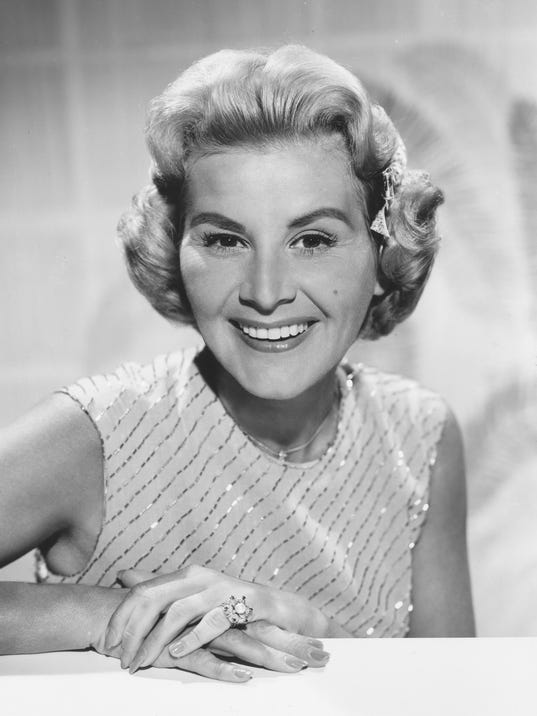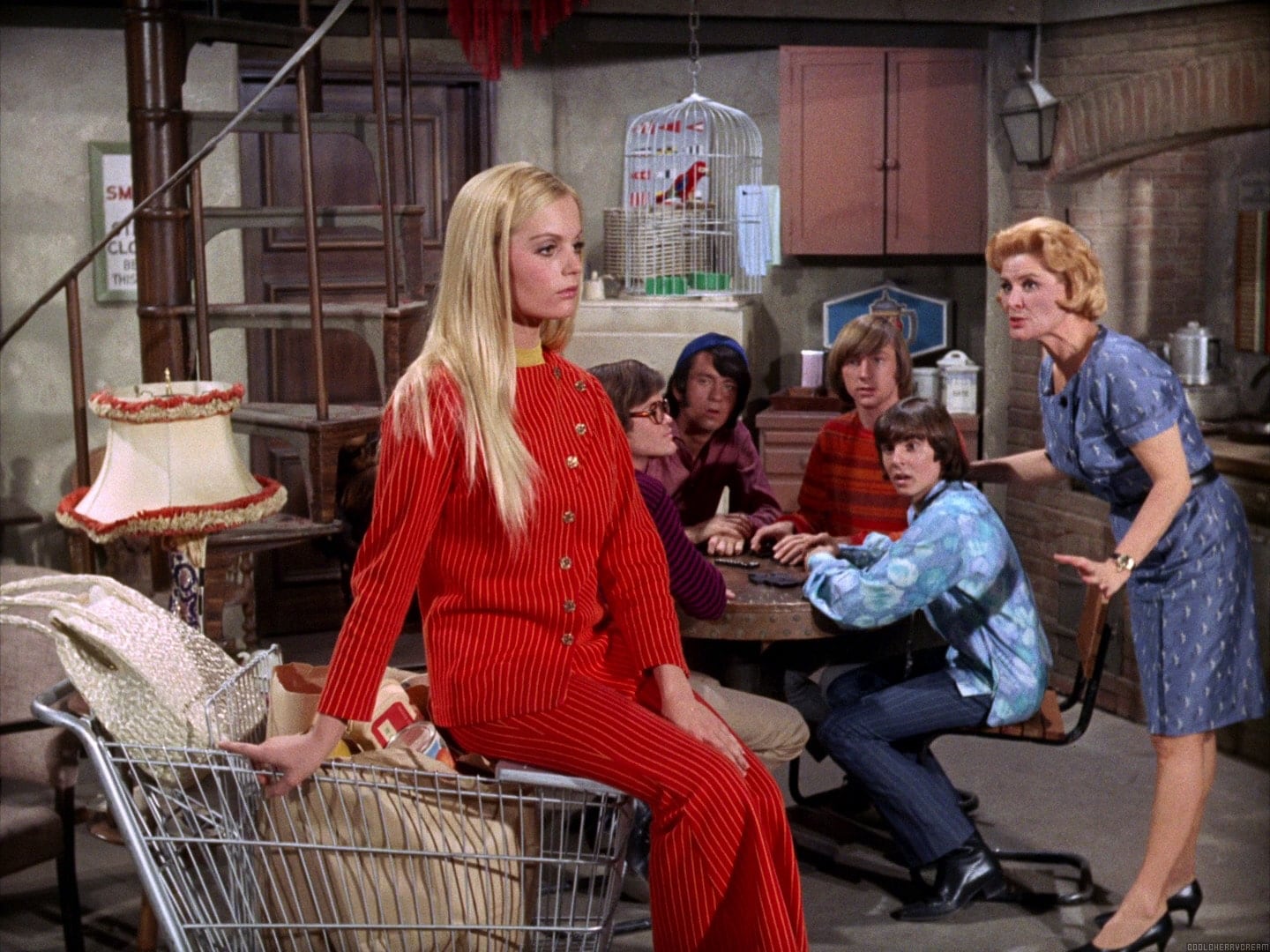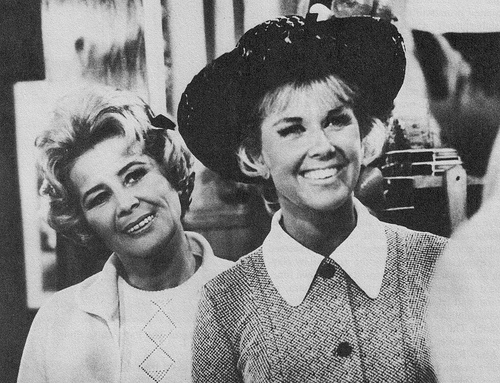| Author | Message |
Actress Rose Marie, best known for ‘The Dick Van Dyke Show,’ has died at 94 Actress Rose Marie, best known for ‘The Dick Van Dyke Show,’ has died at 94, family spokesperson saysPOSTED 7:51 PM, DECEMBER 28, 2017, BY ASSOCIATED PRESS, UPDATED AT 09:02PM, DECEMBER 28, 2017
 Actress Rose Marie and actor Dick Van Dyke (Photo by Alberto E. Rodriguez/Getty Images) LOS ANGELES — Rose Marie, the wisecracking Sally Rogers of “The Dick Van Dyke Show” and a show business lifer who began as a bobbed-hair child star in vaudeville and worked for nearly a century in theater, radio, TV and movies, died Thursday. She was 94.
Marie had been resting in bed at her Los Angeles-area home when a caretaker found she had stopped breathing, said family spokesman Harlan Boll.
“Heaven just got a whole lot funnier” was the tribute posted atop a photo of Marie on her website. She was a child star of the 1920s and 1930s who endeared herself to TV fans on the classic ’60s sitcom that featured Van Dyke and Mary Tyler Moore. The subject of the 2017 documentary “Wait for Your Laugh,” Marie often claimed she had the longest career in entertainment history. It spanned some 90 years, with co-stars ranging from W.C. Fields to Garfield the cat, and the highlight for many was “The Dick Van Dyke Show.” The sitcom was widely loved for its sophisticated writing, inspired casting and insightful view of the inner workings of the then-new medium of television. Van Dyke starred as Rob Petrie, head writer for a hit comedy-variety show and Mary Tyler Moore, in her first major role, played his wife Laura. The blonde, raspy-voiced Marie teamed with her pal Morey Amsterdam as assistant writers.
Drawing on his experiences on Sid Caesar’s shows, Carl Reiner created the series, wrote and directed many episodes and made occasional appearances as the surly star, Alan Brady. After an uncertain beginning in 1961, “The Dick Van Dyke Show” caught on with TV viewers, was still popular when it ended in 1966 and remained a favorite for decades in reruns.
“The Dick Van Dyke Show” not only was an ideal vehicle for Marie’s comic gifts, but was a showcase for her singing, with Sally belting out “Come Rain or Come Shine” and other old favorites during nightclub and party scenes. Marie was especially proud of playing a woman defined by her work, a rare sitcom character at the time who wasn’t “a wife, mother, or housekeeper,” she tweeted in 2017. The actress did have conflicts with Reiner, resenting that Moore was given more prominence than her on the show. Reiner, speaking in “Wait for Your Laugh,” bluntly pushed back. “I used real strong language,” he recalled. “I said, ‘You both have beautiful legs. They wanna look at her legs.'” Nominated three times for Emmys, Rose Marie had yet to turn 40 when she joined the Van Dyke cast, but had been an entertainer for more than 30 years.
She was born Rose Marie Mazetta of Italian-Polish parentage in New York City on Aug. 15, 1923. When she was 3, her mother entered her in an amateur talent contest in Atlantic City as Baby Rose Marie.
“My mother was terrified,” she recalled in a 1992 interview with The Associated Press. “But I went out and sang ‘What Can I Say, Dear, After I Say I’m Sorry?’ and won the contest.” She began singing on radio and was a hit on “The Rudy Vallee Hour.” NBC gave her a seven-year contract and her own show, 15 minutes on Sunday. Her powerful voice gave rise to rumors. “Stories went around that I was really a 45-year-old midget,” she remarked in 1992. “So they sent me on a year-round personal appearance tour of theaters across the country to prove that I was a child.”
Marie sang in a series of movie shorts including “Baby Rose Marie, the Child Wonder” in 1929 and appeared on most of the vaudeville circuits until vaudeville’s demise. Among her friends was one of the country’s most notorious gangsters.
“My father worked as an arsonist for Al Capone,” Marie told People magazine in 2016. “He used to burn down your warehouse if things weren’t going the right way, but I didn’t know that at the time. I was a child star and to me Al was my ‘Uncle Al,’ my mother used to cook for all these guys. Years later when I was working Vegas with (casino owner and known mobster) Bugsy Siegel, I cooked for that generation, I guess I knew then.” In 1946 she married Bobby Guy, a trumpeter in Kay Kyser’s band and later on top NBC radio shows in Hollywood. (They had a daughter, Georgiana). Bobby Guy was just 48 when he died suddenly of a blood infection, in 1964, a loss so devastating Marie wore black for a year and hesitated to take on work beyond “The Dick Van Dyke Show.”
One of her first outside performances was on “The Dean Martin Show,” when she performed the melancholy ballad “Little Girl Blue.” “Then Dean sang ‘(Smile),’ to me and I couldn’t help it, the tears began pouring down,” she recalled in her memoir “Hold the Roses,” published in 2003. “Then Dean kissed me and held me in his arms. It was quite a memorable moment.” Marie joined with Rosemary Clooney, Helen O’Connell and Margaret Whiting in the late 1970s to tour in a successful nightclub act titled “4 Girls 4,” As Rose Marie (she never used a last name professionally), she enjoyed new fame on television. Her quick, surefire timing made her ideal casting as a supporting player. She appeared on “The Doris Day Show,” as the irreverent secretary to the star, and as Frank Fontana’s mother on “Murphy Brown.” For years she was a regular on the “Hollywood Squares” quiz show.
She also appeared in films including “International House” (as Baby Rose Marie in 1933, co-starring with W.C. Fields) and “Big Beat.”
She starred in the Broadway musical “Top Banana” with Phil Silvers, but her experience on the film version resonated decades later in the aftermath of the multiple allegations of sexual harassment against Harvey Weinstein.
A producer suggested that she would get more screen time if she had sex with him. “And in front of everybody, I go, ‘You couldn’t get it up if a flag went by,'” Marie, interviewed for “Wait for Your Laugh,” recalled saying. “Which didn’t sit too well with him. All my numbers were cut in the picture.”
She received a star on the Hollywood Walk of Fame in 2001. In 2017, she extended her reach to social media, her Twitter feed quickly attracting more than 100,000 followers. “I was asked what I wanted my legacy to be,” she wrote in one tweet. “My answer, ‘That I was good at my job & loved every minute of it.’ I wish that for everyone.” Marie is survived by her daughter and son-in-law, Steven Rodrigues.
Just Music-No Categories-Enjoy It! | |
- E-mail - orgNote -  Report post to moderator Report post to moderator |
She was a legend. RIP | |
- E-mail - orgNote -  Report post to moderator Report post to moderator |
| Moderator
|
But .............. A long-time smoker, Clooney was diagnosed with lung cancer at the end of 2001.[12] Around this time, she gave one of her last concerts in Hawaii, backed by the Honolulu Symphony Pops; her last song was "God Bless America". Her final show was at Red Bank New Jersey's Count Basie Theater in December 2001. Despite surgery, she died six months later on June 29, 2002, at her Beverly Hills home. Her nephew, George Clooney, was a pallbearer at her funeral, which was attended by numerous stars, including Al Pacino. She is buried at Saint Patrick's Cemetery, Maysville.
http://www.nytimes.com/20...at-74.html
Makes no sense ......... Ohh purple joy oh purple bliss oh purple rapture! REAL MUSIC by REAL MUSICIANS - Prince "I kind of wish there was a reason for Prince to make the site crash more" ~~ Ben |
- E-mail - orgNote -  Report post to moderator Report post to moderator |
Rosemary Clooney and Rose Marie are 2 different people.
[Edited 12/29/17 16:06pm] | |
- E-mail - orgNote -  Report post to moderator Report post to moderator |
| Moderator
|
Ohh purple joy oh purple bliss oh purple rapture! REAL MUSIC by REAL MUSICIANS - Prince "I kind of wish there was a reason for Prince to make the site crash more" ~~ Ben |
- E-mail - orgNote -  Report post to moderator Report post to moderator |
I thought maybe I missed something. | |
- E-mail - orgNote -  Report post to moderator Report post to moderator |
Film Review: ‘Wait for Your Laugh’Fabled funny lady Rose Marie looks back on her nine decades in showbiz. The recent death of fabled French star Danielle Darrieux at age 100 prompted speculation that she might have sustained the longest career in showbiz. However, still-alive-and-kicking Rose Marie has the edge — though retired (most reluctantly) at a mere 94 years, she started nine full decades earlier, racking up a career that encompassed practically every popular performance medium in the U.S. As lively and likable as its subject, Jason Wise’s documentary “Wait for Your Laugh” pays fond tribute to a tireless trooper whom generations have known mostly as a wisecracking second banana often funnier than the bigger stars she supported. It should draw out patrons “of a certain age” who likely haven’t journeyed to the multiplex for some while. Wheelchair-bound now, Rose Marie’s mind remains sharp as a tack, and she happily walks us through one hell of a professional resume. Born Rose Marie Mazetta in 1923 Manhattan, she was taken to shows from an early age by her fun-loving mother, and her extraordinarily precocious imitations of their stars (particularly Sophie Tucker) led to an amateur talent contest win at age 4. Soon she was signed by NBC — radio’s first nationwide broadcaster — then put on the vaudeville circuit to “prove I was a child” with a uniquely “adult voice,” rather than an adult pretending to be a tot. Her hugely popular act not-infrequently ran afoul of child labor laws, which her father handled, not out of benevolence, but because she was that “mean man’s” meal ticket. She was also his illegitimate child, and he apparently reserved any kindler parental motivations for his “legitimate” other family.
MORE REVIEWSFilm Review: 'Freak Show'TV Review: ‘LA to Vegas’ on Fox
Fame as “Baby Rose Marie” continued for some years, furthered by appearances in several short subjects and the 1933 W.C. Fields classic “International House.” Unlike most child stars, she had little trouble transitioning past that role, re-inventing herself as a successful nightclub singer once she’d matured enough in her teens to assume an adult persona. When her stature had risen enough that she needed a longer act as headliner, she began adding comedy bits, which came so naturally she was soon regarded primarily as a comedienne. That knack got her to Broadway in the hit musical “Top Banana” with Phil Silvers. She was greatly disappointed when all her numbers were cut from the subsequent 1954 film version (purportedly because she refused a producer’s advances). This somewhat soured her on the big screen, where she made relatively few appearances over the ensuing decades.
But the new medium of television would prove her most enduring showcase. After a slew of guest appearances (and recurring roles on “The Bob Cummings Show” and “My Sister Eileen,” neither noted here), she became part of the golden ensemble on “The Dick Van Dyke Show,” joining its star and Morey Amsterdam as staff writers on a fictitious show-within-the-show. Chemistry was ideal off-screen as on; all concerned were “devastated” when creator Carl Reiner decided to pull the plug five years in, before the still-popular series got stale. She had another harmonious working experience on the shorter-lived “Doris Day Show,” and as a quipping panelist for nearly the entire run of syndicated gameshow “The Hollywood Squares.” Otherwise, it was back to guest spots, increasingly cornered into the usual sour niche Hollywood reserves for aging funny ladies: Combative mothers-in-law, grouchy-old-battle-ax neighbors and other harridans.
Not that she complained much. Though hardly a pushover (“You don’t want to cross Rose Marie. She’ll cut your head off,” “Squares” host Peter Marshall says), known to agitate for better (and more) material, she was a driven workaholic who could barely stand to be between gigs. Nonetheless, she found time to raise a daughter with big-band trumpeter Bobby Guy — a true love match that ended with his death from a mysterious blood infection at age 48. She never remarried, always performing with a black mourning bow in her hair.
In 1977, she had a surprise triumph with the revue “4 Girls 4,” co-starring fellow singing “old broads” Margaret Whiting, Rosemary Clooney and Helen O’Connell (who reportedly drove the others nuts). It toured for years. While physical infirmities have prevented her from working since a last voice credit on the “Garfield” cartoon series four years ago, it’s clear here she’s still acutely frustrated by retirement. The role of Sally on “Dick Van Dyke” was ideal for a performer of the old school who was indeed “one of the boys,” accustomed to making her voice loudly heard in male-dominated environs. Given the major creative input others testify to her having on that show and on “4 Girls,” it’s perhaps curious she never pursued directing or writing credits — though given her love of the spotlight, working behind the scenes may have had little appeal. Still brash and confident, Rose Marie has plenty of colorful anecdotes, including her many brushes with mob legends like Al Capone and Bugsy Siegel, who were closely tied to showbiz. “They were absolutely wonderful to me,” she says, as were the likes of Jerry Lewis and Johnny Carson, who were particularly supportive as she faced widowhood. One gets the sense these sentiments are very much heartfelt; she either avoids more barbed comments on less-congenial colleagues, or they didn’t make the final cut of this docu. It’s too bad, however, that in his otherwise judicious decision to limit the number of interviewees here, Wise didn’t find room for one more: the recently deceased Mary Tyler Moore, with whom Rose Marie had a purportedly tense relationship because she’d been told “The Dick Van Dyke Show” would be primarily an office comedy, only to see the main focus drift toward domestic antics featuring MTM’s daffy spouse. Another modest letdown lies in the vintage clips utilized, which presumably for budgetary reasons are very brief, often limited to visuals without sound (or vice versa), and sometimes subbed by amateur behind-the-scenes footage. We don’t really see Rose Marie strut her stuff at length until the closing credits, when a late-1950s-looking TV appearance shows her bantering with the band while singing an Italian novelty ditty. That aside, the editorial package is brisk and bright, with Marshall plugging some gaps in the talking-heads chronicle as an occasional narrator.
Just Music-No Categories-Enjoy It! | |
- E-mail - orgNote -  Report post to moderator Report post to moderator |
| |
- E-mail - orgNote -  Report post to moderator Report post to moderator |
RIP Keep Calm & Listen To Prince | |
- E-mail - orgNote -  Report post to moderator Report post to moderator |
[quote]^ that's very sweet. Thanks for sharing that here Hudson. (*and of course the family) ♫"Trollin, Trolling! We could have fun just trollin'!"♫ | |
- E-mail - orgNote -  Report post to moderator Report post to moderator |
 New topic
New topic Printable
Printable












 moderator
moderator
